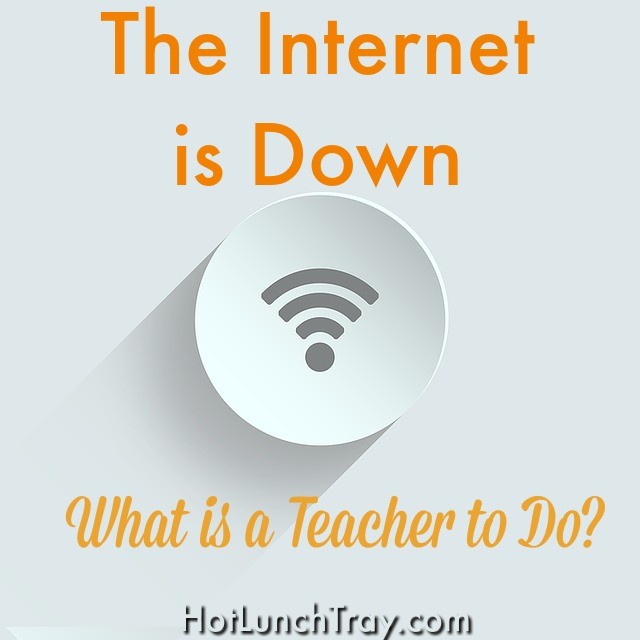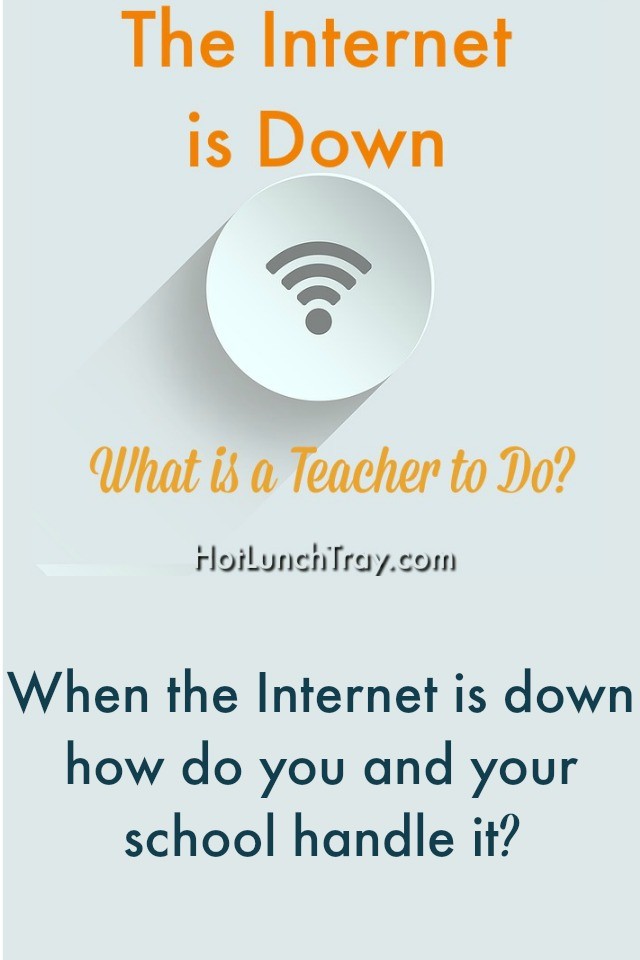I remember back to teaching through an Internet outage and not realizing it until planning period. And I was grateful for the outage – no pesky emails in my Inbox to answer!
But today’s Internet outage in the classroom can shred your teaching instantly.
Let’s agree that NO ONE wants the Internet to go down. No malicious engineer pulls a plug when his spidey-sense tingles that a teacher is close to a breakthrough in a lesson.

Once we have established that no one is conspiring against your classroom, we may want to ask how classroom teachers are made aware of Internet outages? The increasing importance of the Internet in classrooms does not automatically translate into increasingly efficient processes around maintaining that access. Because, while no engineers are plotting the demise of your web-based lesson, they may not help teachers by using old-school methods either.
Does your district/school have an outage page?
The advantages of one place that you can go to view if the Internet is down saves everyone time. It save the engineers time, they do not want to keep answering the same question over and over again.
Teachers do not need to each call or ask someone to find out if the Internet is down for everyone or just them, they do not need to be interrupted by an announcement to the entire school that the Internet is down.
They need to be able to check on page and confirm what they are wondering – without involving others. This is important. Because if a school advertises “The Internet is Down” via an announcement, that means there will be another announcement for when “The Internet is Up” and teachers already have enough announcements.
From the School or District point of view I would not think the advertisement to those reluctant technology users that you-cannot-really-depend-on-us is a good advertisement to entice reluctant users of technology. Those potential users would not have missed The Internet if you had not interrupted their class twice about it with your announcement, but are they more reticent to use technology in the future? Maybe.
Demonstrate Troubleshooting and Flexibility
But of course, The Internet does go down, doesn’t it? And if you are reading this blog post you likely rely on technologies which depend on the Internet.
So – what are YOU supposed to do?
You are supposed to embrace the spotlight!
While an Internet outage is stressful, it is still a teachable moment. You can show your students all the techniques you encourage them to try at home or when their BYOT (bring your own technology) does not work.
Troubleshoot: how do you rule out the connection, the device, the dock? How do you narrow down the problem? What are you avenues for resolution? Is there a procedure you follow which you can model for students? This is helpful to demonstrate how following a procedure is necessary and important – some ideas which may serve you later in your classroom.
Flexibility: No one plans a great lesson hoping to be flexible and ditch it. However, life happens. A good attitude in a situation like a technology-dependent lesson high-jacked can set the tone for a classroom. A positive teacher attitude can help students know how to cope with similar situations they are bound to encounter.
Your actions under this stressful situation will set the tone for when your student’s experience similar situations in your classroom.
Have Hot Spot, Will Travel
The question to Hot Spot or not to Hot Spot might be already answered for you by your building or district administration.
But if it is not, there is some grey area to explore on this question.
Your data plan that you can turn into an Internet connection in a hurry does NOT have any filter on it aside from you. This connection to the very-wide-open-web should only be used by you. You are not covered under the Children’s Internet Protection Act (CIPA) and your mother would not have a lawsuit to bring if you stumbled onto something inappropriate. Do not share your Hot Spot with students. By the same rationale, do not encourage students to use their hot spot to share with others.
Can students use their own Internet connection? It depends. Do they typically use it at school? If so, there is little difference in their typical experience. In my single opinion if a child has an Internet connection of their own the parent is enabling that child to choose when to use that unfiltered Internet. Personally, I would not stop them. However, you do not want to require it.
While searching on any hot spot be careful to not share the search results – wait to display your web page until you have the page where you want it. Google is not to be trusted when all eyes are on your screen for instruction; navigate to the content to share and THEN share your screen.
If a technology-dependent lesson happens to implode on you salvage what you can, but do not hold the students responsible to complete the work as if nothing happened. This is modeling that flexibility again.
No one wants The Internet to go down. But it is always interesting when it does.
Please share your Internet Down stories.







2016-09-01 at 6:36 am
One of the reasons we love using OneNote Class Notebook is that it doesn’t require a continuous internet connection. If the ‘net goes down (and we usually have one outage a year due to some external reason), because all of the content is cached on the device, teachers and students can continue to work and when the network comes back up, everything syncs back as usually. I think it’s really important to choose learning systems that respond well to failure, rather than ones that only work if certain conditions are met.
2021-06-28 at 8:16 am
I really like how you say that although Internet outage is stressful, it is still a teachable moment. Yes, we can still teach the children handy troubleshoot techniques. Our behavior, when an outage happens during lectures, is certainly a role model for the children.
Best,
Olivia